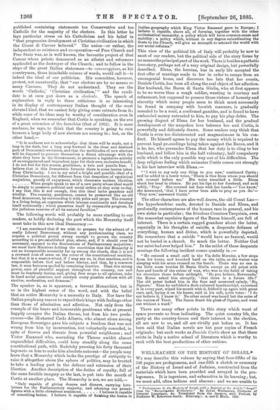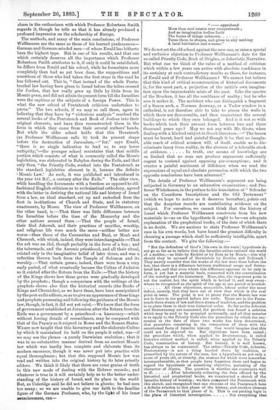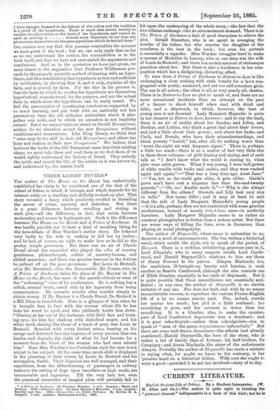WELLHAUSEN ON THE HISTORY OF ISRAEL.* WE may describe this
volume by saying that four-fifths of its 548 pages are prolegomena, and one-fifth a sketch or summary of the History of Israel and of Judaism, constructed from the materials which have been provided and arrayed in the pro- legomena. It is ingenious, and exhaustive in its learning ; but, we must add, often tedious and obscure : and we are unable to
• Prolegomena to the History of Israel, with a Reprint of the Article " Israel" from the "Encyclopedia Britannica." By Julius Wellhansea, Professor of Oriental Lansrnages, Ac. Translated from the German, with Preface, by Professor W. Robertson Smith. Edinburg :1: A. and 0. Black. 1885.
share in the enthusiasm with which Professor Robertson Smith regards it, though he tells us that it has already produced a profound impression on the scholarship of Europe.
The methods, and many of the main conclusions, of Professor Wellhausen are the same as those of his learned predecessors— German and German-minded men—of whom Ewald has hitherto been the highest type. But in one of his results, and that one which certainly deserves all the importance which Professor Robertson smith attributes to it, if only it could be established, he differs from Ewald and his school, while he formulates more completely than had as yet been done, the suppositions and assertions of those who had taken the first steps in the road he has followed out. This is, "that instead of the whole Penta- teuchal law having been given to Israel before the tribes crossed the Jordan, that law really grew up little by little from its Mosaic germ, and did, not attain its present form till the Israelites were the captives or the subjects of a foreign Power. This is what the new school of Pentateuch criticism undertakes to prove." The two schools, if we may so call them, agree in believing that they have by " victorious analysis " resolved the several books of the Pentateuch and Book of Joshua into their original elements, and have then reconstructed them in the form in which they came from their several authors' hands. But while the older school holds that this Hexateuch (as Professor Wellhausen calls it) took its present shape before the destruction of Jerusalem,—" for," says Ewald, "there is no single indication to lead us, to any lower antiquity,"—the younger school maintains that that middle portion which consists of what is commonly called the Mosaic legislation, was elaborated in Babylon during the Exile, and that only then, "the Priestly Code, worked into the Pentateuch as the standard legislative element in it, became the definite • Mosaic Law.' As such, it was published and introduced in the year 444 B.C., a century after the Exile." The older view, while handling the documents with a freedom as opposed to old- fashioned English criticism as to ecclesiastical orthodoxy, agreed with the latter in deriving the national life and history of Israel from a law, an ideal standard, set up and embodied from the first in institutions of Church and State, and in statutory enactments, by Moses. The view of Professor Wellhausen, on the other hand, is :—That there was little difference between the Israelites before the time of the Monarchy and the other nations around them :—That the people of Israel, their God Jehovah, and their practices of sacrifice, worship, and religious life were much the same—neither better nor worse—than those of the Canaanites and Baal, or Moab and Chemosh, with which, indeed, they were interchangeable :—That the ark was an idol, though probably in the form of a box ; and the tabernacle, and the Aaronic priesthood, and all their ritual, existed only in the imaginative belief of later times, and was a reflection thrown back from the Temple of Solomon and its worship :—That certain germs, indeed, there were from a very early period, of what eventually became the Cultus of Judaism as it existed after the Return from the Exile :—That the history of the Kings shows how these germs were gradually developed by the prophets ; though a comparison with the writings of the prophets shows also that the historical records (the Books of Kings and Chronicles), as we have them, have been manipulated by the post-exilic editors, so as to give an appearance of these kings and prophets possessing and following the guidance of the Mosaic law, though, in fact, it did not yet exist.—We know that the form of government established at Jerusalem after the Return from the Exile was a government by a priesthood—a hierocracy—which without forcing details of resemblance, may be compared with that of the Papacy as it reigned in Rome and the Roman States. We are now taught that this hierooracy and the elaborate Cultus by which it maintained its hold on the people it ruled, was—if we may use the phrase—a purely Darwinian evolution ; that it was in no substantive manner derived from an ancient Mosaic law which was hardly less complete and elaborate than its modern successor, though it was never put into practice with equal thoroughness ; but that this supposed Mosaic law was read and written .into the original history by its later priestly editors. We think it likely that there are some grains of truth in this new mode of dealing with the Hebrew records ; and whatever is true in it will certainly help us to the better under- standing of the history of Israel, and its place in the world• Bat, as Coleridge said he did not believe in ghosts; he had seen too many ; so we are unable to give our faith to the familiar figure of the German Professor, who, by the light of his inner onsciousness, can-
"— apprehend More than cool reason ever comprehends ; And as imagination bodies forth The forms of things unknown
Tarns them to shapes, and gives to airy nothing A local habitation and a name."
We do not set the old school against the new one, or raise a special and exclusive objection to Professor Wellhausen's date for the so-called Priestly Code, Book of Origins, or Jehovistic Narrative. But what can we think of the value of a method of criticism which within a few years can arrive with absolute confidence in its certainty at such contradictory results as those, for instance, of Ewald and of Professor Wellhausen ? We cannot but believe that this kind of critical reconstruction of historical documents is, for the most part, a projection of the critic's own imagina- tion upon the impenetrable mists of the past. Like the spectre of the Brocken, it has all the semblance of reality ; but he who sees it makes it. The architect who can distinguish a fragment of a Saxon arch, a Norman doorway, or a Tudor window in a cathedral, is not therefore able to take to pieces the walls in which these are discoverable, and then reconstruct the several buildings to which they once belonged. And is it not so with books which took their present form between two and three thousand years ago ? May we not say with Mr. Grote, when dealing with a kindred subject in Greek literature :—" The lesson must be learnt, hard and painful though it be, that no imagin- able reach of critical acumen will, of itself, enable us to dis- criminate fancy from reality, in the absence of a tolerable stock of evidence In truth, our means of knowledge are so limited that no man can produce arguments sufficiently cogent to contend against opposing pre-conceptions; and it creates a painful sentiment of diffidence when we read the expressions of equal and absolute persuasion with which the two opposite conclusions have been advanced."
The details of Professor Wellhausen'a argument are being subjected in Germany to an exhaustive examination ; and Pro- fessor Whitehouse, in the preface to his translation of " Schrader on the Cuneiform Inscriptions and the Old Testament" (which we hope to notice as it deserves hereafter), points out that the Assyrian records are contributing evidence on the subject. For ourselves, we cannot think that the history of Israel which Professor Wellhausen constructs from his new materials is—as on the hypothesis it ought to be—an adequate explanation of the prophetical books, of the date of which there is no doubt. We are anxious to state Professor Wellbansen's case in his own words, but have found the greatest difficulty in choosing a passage which shall be sufficiently intelligible, apart from the context. We give the following :- " But the defenders of Graf's [his own in the main; hypothesis do not go so far as to believe that the Israelite•cultns entered the world of a sudden,—as little by Ezekiel or by Ezra as by Moses,—else why should they be accused of Darwinism by Zackler and Delitzsch ? They merely consider that the works of the law were done before the law, that there is a difference between traditional usage and formu- lated law, and that even where this difference appears to be only in form, it yet has a material basis, connected with the centralisation of the worship and the hierocracy. Here, also, the important point is not the matter, but the spirit which is behind it, and may every- where be recognised as the spirit of the age at one period or another.
All these objections, meanwhile, labour under the same defect, namely, that they have out of view that which is the real point at issue. The point is not to prove that the Mosaic law was not in force in the period before the exile. There are in the Penta- teuch three strata of law and three strata of tradition, and the problem is to place them in their true historical order. So far as the Jehovist and Deuteronomy are concerned, the problem has, found a solution which may be said to be accepted universally, and all that remains is to apply to the Priestly Code also the procedure by which the suc- cession or the date of these two works has been determined, that procedure consisting in the comparison of them with the ascertained facts of Israelite history. One would imagine that this could not be objected to. But objections have been raised ; the procedure which, when applied to Deuteronomy, is called historico.critical method, is called, when applied to the Priestly Code, construction of history. But history, it is well known, has always to be constructed. The order—Priestly Code, Jehovist, Deuteronomy—is not a thing handed down by tradition, or prescribed by the nature of the case, but a hypothesis as yet only a score of, years old, or thereby, the reasons for which were somewhat incomprehensible, so that people have forgotten them and begun to regard the hypothesis as something objective, partaking of the character of dogma. The question is whether one constructs well
or ill After laboriously collecting, the data offered by the historical and prophetical books, we constructed a sketch of the Israelite history of worship ; we then compared the Pentateuch with this sketch, and recognised that one element of the Pentateuch bore a definite relation to this phase of the history, and another element of the Pentateuch to that phase of it. This is not putting logic in
the place of historical investigation Not everything that
I have brought forward in the history of the coitus and the tradition is a proof of the hypothesis. There is much that serves merely to explain the phenomena at the basis of the hypothesis, and cannot be used as proving it Almost more important to me than the phenomena themselves are the presuppositions which lie behind them."
Our readers may say that this passage contradicts the account we have given of the book ; but we can only reply that as far as we can understand the author, the contradiction is in the book itself, and that we have not over-stated the arguments and conclusions. And as to the quotation we have just given, we must demur to the suggestion that Professor Wellhausen pro- ceeds by the properly scientific method of starting with an hypo- thesis, and then establishing that hypothesis as true and sufficient by verification, by showing that it, and it only, explains all the facts, and is proved by them. For the flaw in his process is, that the facts by which he verifies his hypothesis are themselves hypothetical, manufactured for the purpose, and not the actual facts by which alone the hypothesis can be really tested. We feel the presumption of questioning conclusions supported by so much learning, and put forth with an authority not less peremptory than the old orthodox authorities which it alto- gether sets aside, and to which we ourselves do not implicity submit. But if we cannot take our stand on the old Mumpsimus, neither do we therefore accept the new Sumpsimus without conditions and reservations. Like King Henry, we think that "some may be too stiff in their old Mumpsimus, and others too busy and curious in their new Sumpsimus." We believe that however the books of the Old Testament came into their existing shape, we must take them and read them as we find them, if we would rightly understand the history of Israel. They embody the spirit, and record the life, of the nation as it was known to, and understood by, the nation itself.




































 Previous page
Previous page